

As the son of a building constructor, Richard Klinger loved technological progress and engineering: as a boy, he was already a tinkerer, going on to study Mechanical Engineering in Vienna. In 1886, he founded a workshop, thus laying the foundation for the Klinger family’s industrial activities. Today, more than 130 years later, KLINGER is represented by 45 operating companies in over 60 countries worldwide.
Throughout all five generations, the members of the family have been committed above all to the development and future of the company.
As the son of a building constructor, Richard Klinger loved technological progress and engineering: as a boy, he was already a tinkerer, going on to study Mechanical Engineering in Vienna. In 1886, he founded a workshop, thus laying the foundation for the Klinger family’s industrial activities. Today, more than 130 years later, KLINGER is represented by 45 operating companies in over 60 countries worldwide.
Throughout all five generations, the members of the family have been committed above all to the development and future of the company.
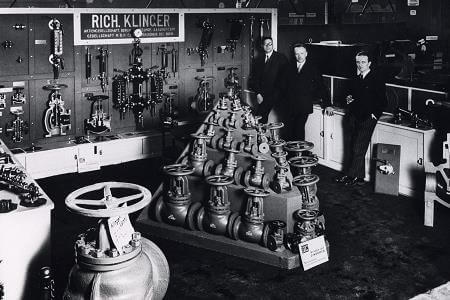
![]() 1886: The young engineer Richard Klinger opens a small engineering workshop in Vienna.
1886: The young engineer Richard Klinger opens a small engineering workshop in Vienna.
![]() A mere four years later he invents the reflex level gauge.
A mere four years later he invents the reflex level gauge.
![]() 1893: The plant in Gumpoldskirchen is put into operation.
1893: The plant in Gumpoldskirchen is put into operation.
![]() 1898: Creation of Klingerit, , the revolutionary calendared compressed fiber gasket material.
1898: Creation of Klingerit, , the revolutionary calendared compressed fiber gasket material.
![]() 1922: KLINGER manufactures the first valve with an elastic, replaceable sealing system for the high temperature range. With the KLINGER piston valve, the standard industrial valve was invented.
1922: KLINGER manufactures the first valve with an elastic, replaceable sealing system for the high temperature range. With the KLINGER piston valve, the standard industrial valve was invented.
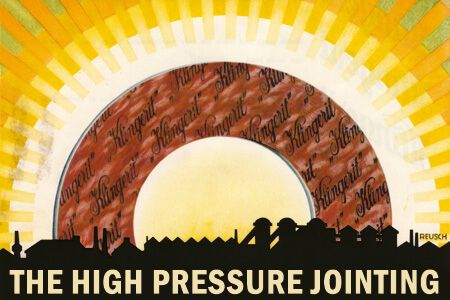
![]() Karl Klinger takes over the business.
Karl Klinger takes over the business.
![]() 1924-1931: Further development of the sealing segment: the cylinder-head gasket “Klingerit 1000”, the alkaline gasket “Acidit”, and the oil-resistant gasket “Oilit”
1924-1931: Further development of the sealing segment: the cylinder-head gasket “Klingerit 1000”, the alkaline gasket “Acidit”, and the oil-resistant gasket “Oilit”
![]() 1928: The development of seals for internal combustion engines opens up a new market segment – the production of brake pads.
1928: The development of seals for internal combustion engines opens up a new market segment – the production of brake pads.
![]() With the beginning of World War II, the KLINGER factories are forced to switch to armaments production. In 1945, all transportable machines were dismantled by Russian troops. In 1947, regular production is resumed.
With the beginning of World War II, the KLINGER factories are forced to switch to armaments production. In 1945, all transportable machines were dismantled by Russian troops. In 1947, regular production is resumed.
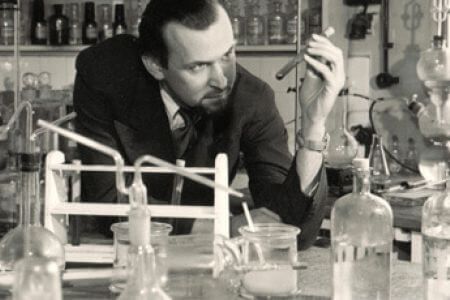
![]() Hubert Klinger-Lohr becomes the new managing director of the KLINGER Group.
Hubert Klinger-Lohr becomes the new managing director of the KLINGER Group.
![]() Expansion of manufacturing sites and build-up of a European distribution network with 24/7 service.
Expansion of manufacturing sites and build-up of a European distribution network with 24/7 service.
![]() 1980: Development of PTFE sealing materials and introduction of KLINGERSIL, the world’s first asbestos-free jointing material. In the coming years KLINGERSIL replaces Klingerit on the market.
1980: Development of PTFE sealing materials and introduction of KLINGERSIL, the world’s first asbestos-free jointing material. In the coming years KLINGERSIL replaces Klingerit on the market.
![]() Production of large industrial-scale ball valves: KLINGER Ballostar, a star product that is still used today in numerous district heating plants worldwide.
Production of large industrial-scale ball valves: KLINGER Ballostar, a star product that is still used today in numerous district heating plants worldwide.

![]() 1886: The young engineer Richard Klinger opens a small engineering workshop in Vienna.
1886: The young engineer Richard Klinger opens a small engineering workshop in Vienna.
![]() A mere four years later he invents the reflex level gauge.
A mere four years later he invents the reflex level gauge.
![]() 1893: The plant in Gumpoldskirchen is put into operation.
1893: The plant in Gumpoldskirchen is put into operation.
![]() 1898: Creation of Klingerit, , the revolutionary calendared compressed fiber gasket material.
1898: Creation of Klingerit, , the revolutionary calendared compressed fiber gasket material.
![]() 1922: KLINGER manufactures the first valve with an elastic, replaceable sealing system for the high temperature range. With the KLINGER piston valve, the standard industrial valve was invented.
1922: KLINGER manufactures the first valve with an elastic, replaceable sealing system for the high temperature range. With the KLINGER piston valve, the standard industrial valve was invented.

![]() Karl Klinger takes over the business.
Karl Klinger takes over the business.
![]() 1924-1931: Further development of the sealing segment: the cylinder-head gasket “Klingerit 1000”, the alkaline gasket “Acidit”, and the oil-resistant gasket “Oilit”
1924-1931: Further development of the sealing segment: the cylinder-head gasket “Klingerit 1000”, the alkaline gasket “Acidit”, and the oil-resistant gasket “Oilit”
![]() 1928: The development of seals for internal combustion engines opens up a new market segment – the production of brake pads.
1928: The development of seals for internal combustion engines opens up a new market segment – the production of brake pads.
![]() With the beginning of World War II, the KLINGER factories are forced to switch to armaments production. In 1945, all transportable machines were dismantled by Russian troops. In 1947, regular production is resumed.
With the beginning of World War II, the KLINGER factories are forced to switch to armaments production. In 1945, all transportable machines were dismantled by Russian troops. In 1947, regular production is resumed.

![]() Hubert Klinger-Lohr becomes the new managing director of the KLINGER Group.
Hubert Klinger-Lohr becomes the new managing director of the KLINGER Group.
![]() Expansion of manufacturing sites and build-up of a European distribution network with 24/7 service.
Expansion of manufacturing sites and build-up of a European distribution network with 24/7 service.
![]() 1980: Development of PTFE sealing materials and introduction of KLINGERSIL, the world’s first asbestos-free jointing material. In the coming years KLINGERSIL replaces Klingerit on the market.
1980: Development of PTFE sealing materials and introduction of KLINGERSIL, the world’s first asbestos-free jointing material. In the coming years KLINGERSIL replaces Klingerit on the market.
![]() Production of large industrial-scale ball valves: KLINGER Ballostar, a star product that is still used today in numerous district heating plants worldwide.
Production of large industrial-scale ball valves: KLINGER Ballostar, a star product that is still used today in numerous district heating plants worldwide.
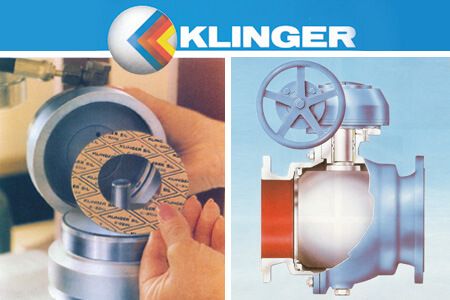
![]() Thomas Klinger-Lohr is the fourth generation to lead the company.
Thomas Klinger-Lohr is the fourth generation to lead the company.
![]() 1992: Establishing the KLINGER Holding as the parent company of the growing KLINGER Group.
1992: Establishing the KLINGER Holding as the parent company of the growing KLINGER Group.
![]() Merger of the automotive segment with the German market leader Elring.
Merger of the automotive segment with the German market leader Elring.
![]() Introduction of a revolutionary high-temperature sealing material: KLINGER Quantum.
Introduction of a revolutionary high-temperature sealing material: KLINGER Quantum.
![]() Opening of new subsidiaries in Russia, Thailand and China.
Opening of new subsidiaries in Russia, Thailand and China.
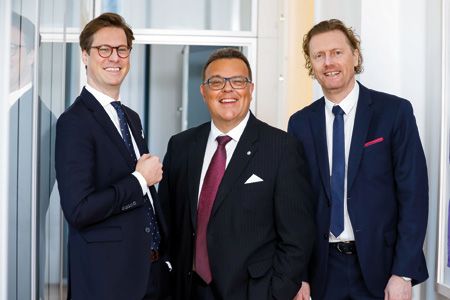
![]() 2010-2015: Heinz Scharl leads the company as CEO.
2010-2015: Heinz Scharl leads the company as CEO.
![]() Strategic acquisitions in target segments. Focus on services and organic growth outside of Europe.
Strategic acquisitions in target segments. Focus on services and organic growth outside of Europe.
![]() 2015 – 2017: The Board of Directors, consisting of Daniel Schibli (CEO) and Peter Müller (CFO), takes over the management of the KLINGER Group.
2015 – 2017: The Board of Directors, consisting of Daniel Schibli (CEO) and Peter Müller (CFO), takes over the management of the KLINGER Group.
![]() In 2018, Christoph Klinger-Lohr joins the Board of Directors as CEO.
In 2018, Christoph Klinger-Lohr joins the Board of Directors as CEO.
![]() By the time the company celebrates its 135th anniversary in 2021, the KLINGER Group consists of 45 entities in more than 60 countries worldwide.
By the time the company celebrates its 135th anniversary in 2021, the KLINGER Group consists of 45 entities in more than 60 countries worldwide.

![]() Thomas Klinger-Lohr is the fourth generation to lead the company.
Thomas Klinger-Lohr is the fourth generation to lead the company.
![]() 1992: Establishing the KLINGER Holding as the parent company of the growing KLINGER Group.
1992: Establishing the KLINGER Holding as the parent company of the growing KLINGER Group.
![]() Merger of the automotive segment with the German market leader Elring.
Merger of the automotive segment with the German market leader Elring.
![]() Introduction of a revolutionary high-temperature sealing material: KLINGER Quantum.
Introduction of a revolutionary high-temperature sealing material: KLINGER Quantum.
![]() Opening of new subsidiaries in Russia, Thailand and China.
Opening of new subsidiaries in Russia, Thailand and China.

![]() 2010-2015: Heinz Scharl leads the company as CEO.
2010-2015: Heinz Scharl leads the company as CEO.
![]() Strategic acquisitions in target segments. Focus on services and organic growth outside of Europe.
Strategic acquisitions in target segments. Focus on services and organic growth outside of Europe.
![]() 2015 – 2017: The Board of Directors, consisting of Daniel Schibli (CEO) and Peter Müller (CFO), takes over the management of the KLINGER Group.
2015 – 2017: The Board of Directors, consisting of Daniel Schibli (CEO) and Peter Müller (CFO), takes over the management of the KLINGER Group.
![]() In 2018, Christoph Klinger-Lohr joins the Board of Directors as CEO.
In 2018, Christoph Klinger-Lohr joins the Board of Directors as CEO.
![]() By the time the company celebrates its 135th anniversary in 2021, the KLINGER Group consists of 45 entities in more than 60 countries worldwide.
By the time the company celebrates its 135th anniversary in 2021, the KLINGER Group consists of 45 entities in more than 60 countries worldwide.
